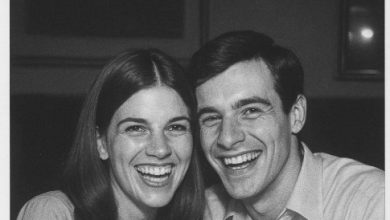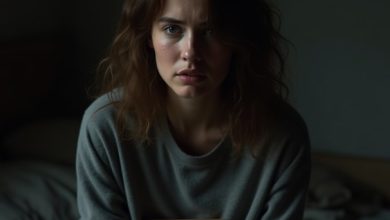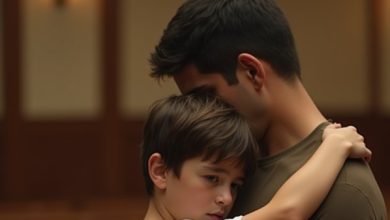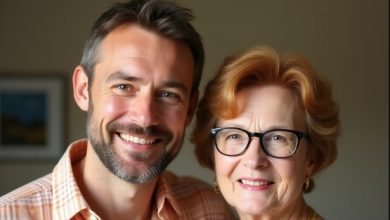I Taunted the Struggling Old Biker, Only for Him to Produce My Mother’s Picture
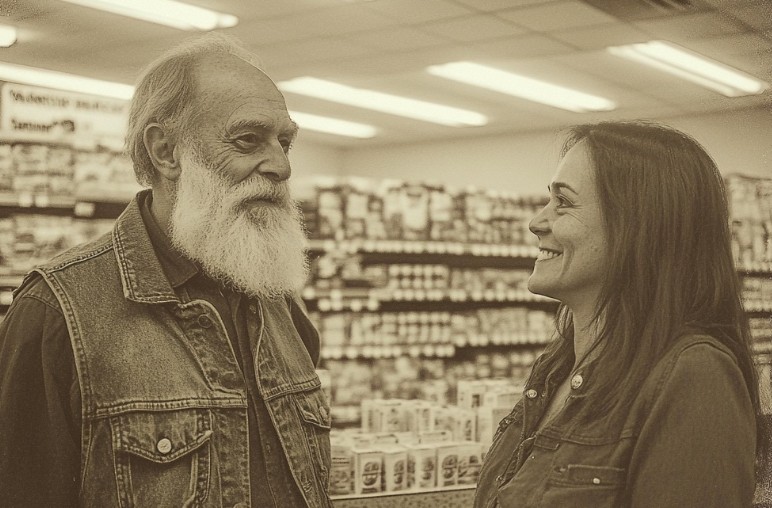
The old biker was standing at the grocery checkout, slowly counting a small stack of crumpled dollar bills, when I couldn’t help myself—I laughed out loud and leaned across the line so everyone could hear. “Maybe if you didn’t waste every cent on that motorcycle of yours,” I said, voice loud enough for half the customers to look up, “you wouldn’t have to pinch pennies at the register.” A few people chuckled. I felt the warm flush of approval.
The man’s hands froze over the bills. He turned slowly, and I braced for anger—or at least embarrassment. Instead, his eyes met mine with a look that made the grin die on my face: pure, terrible recognition, as if he’d known me all my life. My heart tightened.
“Ma’am,” he said, his voice low and gravelly, “I have exactly forty-seven dollars and eighty-three cents here. My groceries come to fifty-one twenty. If I’m taking too long, I’ll just put something back.”
I rolled my eyes, encouraged by the titters around me. “Typical biker trash,” I shot back, louder still. “Probably spending all your welfare check on—”
“SARAH KEMPLEY.” His interruption echoed through the quieting store. My blood ran cold. No one had called me by my maiden name in fifteen years. “Daughter of Richard Kempley. Born February 12th, 1987, at Riverside General Hospital.”
The line behind me shuffled uncomfortably. My hand twitched toward my purse—my phone was in there, and I was this close to dialing security. Other shoppers looked between us, sensing the sharp shift in the air.
He reached into his battered wallet and slowly pulled out a faded photograph. With a trembling hand, he laid it on the conveyor belt between us. “I’ve carried this with me for thirty-six years,” he said. “Hoped I’d never need to show it. But here we are.”
I stared at the black-and-white image: a hospital room, a young woman in a bed—exhausted, pale, but smiling—and a proud young man standing beside her, holding her hand. My heart twisted when I recognized the new mother. It was my own mother. The man at the checkout, the old biker I’d so casually insulted, was standing beside her like he owned her world.
I staggered back, clutching the conveyor. “What… how…” I whispered. “My father told me my mother had no family. That I was all he had.”
The biker—Danny, as I would soon learn—laughed, but it was bitter, without humor. “Your father.” He spat the words as though they tasted terrible. “Richard Kempley said plenty of things to keep you from me.”
The teenager at the register cleared her throat. “Um, ma’am? Should I call security?”
I managed a shaky shake of my head. “No. I… could you ring up his groceries? I’ll pay.”
He stiffened, pride flaring in his eyes. “I don’t need your charity.”
“It’s not charity,” I said, my voice catching. “It’s… allow me to fix my mistake.”
He watched me as the clerk scanned his remaining items—fresh vegetables, a package of chicken, a loaf of bread—then he let me pay. When he stepped away, I followed, still trembling. I called after him, “Wait—can we talk?”
He paused in the aisle, looking at me as though I were a dream he had half-forgotten. Then he nodded.
An hour later, I found myself in a quiet coffee shop, facing the old biker who had just revealed himself to be my father. My own father—Richard—had died five years earlier. I had grown up with him alone, learning to admire his steadiness, never questioning his stories about my mother. Now, across from me, sat Daniel “Danny” Morrison: kind eyes behind a thick white beard, rough hands folded around a steaming mug of coffee.
“My wife’s name was Linda Marie Hoffman,” he began, voice soft. “We met at the veterans’ hospital, after I came home from Vietnam. I was a wreck—PTSD, anxiety—though no one called it that then. She was working at the VA. She helped me more than any doctor could.”
He slid another photo across the table: he and my mother on a motorcycle, laughing on a sunny day; the two of them in wedding attire, her in a simple white dress, him in his dress uniform; and one of my mother pregnant, her hand on her belly, his arm around her shoulders.
“We were happy,” he said. “When you were born, I thought everything would be different. I had a reason to fight my demons. But then Linda got sick. Cancer. It moved fast.”
My throat tightened. I’d known all that—my father had told me my mother died of cancer—but I’d never heard how her life had been shared.
“Richard was her oncologist,” Danny continued. “Young, ambitious doctor. Came from a good family. Everything I wasn’t—a stable job, a respectable name, a secure home.”
He paused, looking down at his coffee. “When she realized she was dying, she was terrified about what would happen to you. Richard convinced her—convinced both of us—that he could give you everything you deserved. He said if she signed over guardianship to him, he’d take care of you when she was gone. We believed him.”
“After she died,” Danny said quietly, “Richard had legal papers ready. A restraining order. Said I was a danger—my PTSD, my past. His lawyer friends didn’t blink. He amended your birth certificate, changed your last name when he remarried. It was as if I never existed.”
I felt the floor shift beneath me. The childhood I thought I had—the loving home, the strong father figure—was built on a lie.
“I wrote you letters,” Danny said, tugging at his sleeve. “Every birthday, every Christmas. Richard sent them all back, unopened. I kept them, though. I held onto hope that one day you’d learn the truth.”
He reached into his jacket and produced a thick bundle tied with rubber bands. “Thirty-six years of letters,” he said. “I never mailed them—what good would they have done? But I kept writing, kept holding onto you.”
I took the bundle with shaking hands, feeling its weight—past hopes, regrets, words that never reached me. “Why did you stay away?” I asked. “Why not fight for me, break that restraining order?”
He sighed. “A biker with PTSD against a respected doctor and a court’s order? I would have done more harm than good. I tracked your life quietly—your college graduation, your wedding invitation, the births of your kids. I wanted to protect you from the scandal, the gossip. But I never stopped loving you.”
My eyes stung with tears. The arrogance and cruelty I’d shown in the grocery store returned to me like a slap. I had mocked a stranger, unaware of the miracle standing before me.
“What about the groceries?” I asked softly. “You were counting change to buy groceries.”
He shrugged, a wry smile tugging at his lips. “A man’s got to eat.”
I laughed, a sudden, bitter sound. “I’m so sorry, Dad. Sarah Mitchell,” I said, offering him my hand. “I’m your daughter, Sarah.”
Danny’s face broke into a tired smile. “I always hoped you’d call me that.”
We talked for hours, sharing photographs and stories. He told me about my mother—her love of dancing, her gentle patience with children. He told me about their plans to restore that old motorcycle and take me on rides when I was older. He told me about his life on the road—the odd jobs, the nights spent under bridges when money ran out, the years of wrestling with his own memories.
When I finally looked up, the coffee shop was closing. I realized I’d been pouring my heart out to the man I had once humiliated. My shame was deep, but it was eclipsed by the joy of discovering the father I had never known.
“I want you to meet your grandchildren,” I said, thinking of my two lively daughters who adored stories of heroic soldiers and brave leaders. “I want them to know their real grandfather.”
Danny’s eyes glistened. “I’d be honored.”
The next morning, we returned to the grocery store. I refused to let him pay again. As the line formed behind us, I whispered, “Maybe next time, think twice before mocking someone in public.”
He laughed, his deep voice full of relief. “Lesson learned.”
Over the following weeks, Danny moved in with us while his Harley was in the shop. He repaired bikes with my husband in the garage and read bedtime stories to my daughters. At my office holiday party, he arrived in his leather vest and well-worn jeans. My colleagues murmured, but when they watched him speak gently with a shy intern or guide an elderly neighbor’s car to a safe spot, their doubts faded.
Today, two years later, my daughters—ages eight and twelve—call him Grandpa_Dan. He takes them for rides around the block in a sturdy sidecar, helmets strapped on, laughter ringing through the neighborhood. My life has been transformed by a past I never knew I’d had.
What can we learn from my story? Perhaps that everyone carries unseen burdens, secret histories shaped by love and sacrifice. That a single cruel moment—my callous laughter at the checkout—can lead to an astonishing revelation. And that blood sometimes holds the power to heal old wounds, no matter how deeply they’re buried.
My children will grow up knowing the truth of their grandparents’ love, a story I can now share in full. And I will never again judge a stranger by their appearance or stereotype. Because sometimes, the most unexpected people turn out to be our truest family—and the bravest heroes in our lives.
